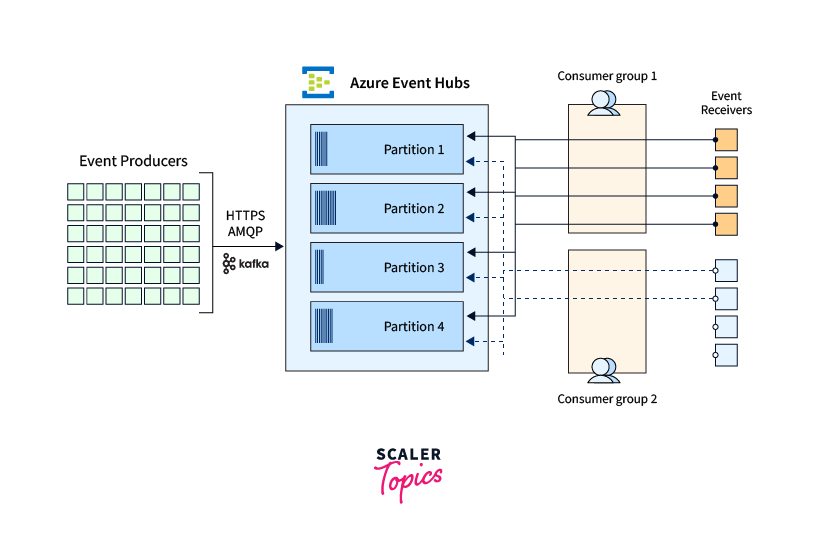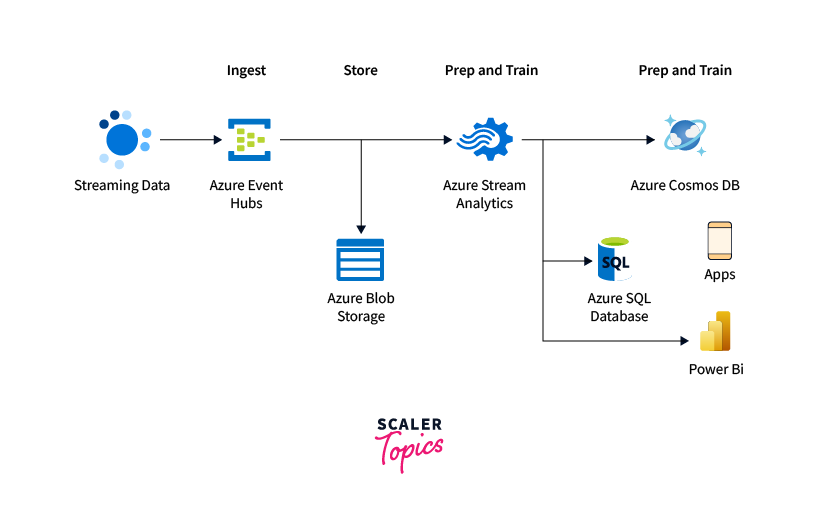Azure Event Hub
Overview
Azure Event Hubs is a cloud-based event streaming platform that enables the ingestion and processing of large volumes of events and telemetry data. It provides a highly scalable and reliable solution for real-time event processing and analysis. With Event Hubs, you can collect and stream data from various sources such as applications, devices, and IoT sensors. It supports high throughput and low latency event ingestion, making it suitable for high-performance scenarios. Event Hubs integrates seamlessly with other Azure services, allowing you to build real-time analytics, data pipelines, and event-driven applications.
Introduction to Azure Event Hub
Azure Event Hubs is a cloud-based event streaming platform offered by Microsoft Azure. It is designed to handle massive volumes of events and telemetry data in real time. Event Hubs provides a highly scalable and reliable solution for ingesting, processing, and storing event data from various sources such as applications, devices, and IoT sensors.
Messages Vs Events
Certainly! Here's a comparison between messages and events presented in tabular form:
| Messages | Events | |
|---|---|---|
| Purpose | Exchange information between components or systems | Notify significant occurrences or changes within a system |
| Content | Can include commands or instructions with data payload | Represent something that has happened or is happening |
| Usage | Often used in messaging systems for communication | Found in event-driven architectures for triggering actions |
| Communication | Can be synchronous or asynchronous | Generally asynchronous |
| Format | Follow predefined formats and protocols for interoperability | Often loosely structured, carrying contextual information |
Need of Azure Event Hub
Azure Event Hubs are essential in various scenarios where real-time event ingestion, processing, and analysis are required.
Here are some key reasons why Azure Event Hubs are needed:
1. High Scalability: Azure Event Hubs is designed to handle massive volumes of events. It can seamlessly scale to accommodate millions of events per second, making it suitable for scenarios with high event ingestion rates.
2. Real-time Event Processing: Event Hubs enable real-time processing of events, allowing organizations to respond quickly to events as they occur. This is crucial for applications such as IoT telemetry, log processing, fraud detection, and real-time analytics.
3. Reliable Event Ingestion: Event Hubs provides reliable event ingestion with features like event capture, data retention, and data replay. It ensures that events are captured, stored, and made available for further analysis, auditing, or replaying.
What is the Difference Between Azure Event Hub, IoT Hub, Event Grid, Service Bus, Azure Storage Queues?
Azure Event Hub, IoT Hub, Event Grid, Service Bus, and Azure Storage Queues are all messaging and event-driven services provided by Azure, but they serve different purposes and have distinct characteristics.
Here's a comparison of these services:
1. Azure Event Hub:
- Purpose: Designed for high-throughput, real-time event streaming and ingestion at scale.
- Use Cases: IoT telemetry ingestion, log processing, real-time analytics, and big data ingestion.
2. Azure IoT Hub:
- Purpose: Specifically designed for IoT scenarios, providing bidirectional communication, device management, and security for IoT devices.
- Use Cases: Device-to-cloud and cloud-to-device messaging, device management, firmware updates, and IoT telemetry.
3. Azure Event Grid:
- Purpose: A fully managed event routing service that simplifies event-based programming and reacts to events from various Azure services.
- Use Cases: Event-driven architectures, serverless applications, event-driven workflows, and event processing.
4. Azure Service Bus:
- Purpose: A reliable cloud messaging service for building decoupled, distributed applications.
- Use Cases: Asynchronous messaging, publish-subscribe (topic-subscription) patterns, and reliable message queuing.
5. Azure Storage Queues:
- Purpose: Simple, durable, and scalable messaging queues for asynchronous communication between components.
- Use Cases: Decoupling application components, workload levelling, and reliable asynchronous processing.
Azure Event Hub Architecture
The architecture of Azure Event Hubs consists of various components and entities working together to enable high-throughput event ingestion, processing, and analysis.
Here's an overview of the Azure Event Hub architecture:
1. Event Publishers: These are the sources that generate and send events to Azure Event Hubs. Publishers can be devices, applications, or services that produce event data. They communicate with Event Hubs using one of the supported protocols like AMQP, MQTT, or HTTPS.
2. Event Hubs: The core component of the architecture, Event Hubs is a highly scalable and distributed event streaming platform. It receives, stores, and manages the incoming events from publishers.
3. Event Hub Partitions: Event Hubs are divided into multiple partitions, which are ordered, immutable sequences of events. Each partition can be thought of as an independent stream of events.

The above picture shows the architecture of Event Hub stream processing.
Azure Event Grid
Azure Event Grid is a fully managed event routing service provided by Microsoft Azure. It simplifies the development of event-driven applications and enables reactive programming by providing a centralized event management and routing infrastructure.
Features of Azure Event Grid
Here's an overview of Azure Event Grid:
1. Publish-Subscribe Model: Azure Event Grid follows a publish-subscribe pattern, where publishers generate events and subscribers react to those events. Publishers can be Azure services, custom applications, or external sources.
2. Event Sources: Event Grid supports a wide range of event sources, including Azure services like Blob Storage, Event Hubs, IoT Hub, and more. It also allows custom topics for publishing events from custom applications or third-party services.
3. Event Handlers: Subscribers or event handlers subscribe to events from Event Grid and react to them. They can perform actions such as running serverless functions, calling APIs, or triggering workflows based on the received events.
Azure Event Hub vs Event Grid
Certainly! Here's a tabular comparison between Azure Event Hub and Azure Event Grid:
| Azure Event Hub | Azure Event Grid | |
|---|---|---|
| Purpose | High-throughput event streaming and ingestion at scale | Simplified event-based programming and centralized event routing |
| Use Cases | IoT telemetry, log processing, real-time analytics | Event-driven workflows, serverless applications, reactive programming |
| Features | High-throughput ingestion, data retention, event capture | Event routing, filtering, flexible event subscriptions |
| Delivery | Ordered event delivery, supports industry-standard protocols | At-least-once delivery guarantees, multiple endpoint delivery |
Concepts of Azure Event Hub
Azure Event Hub is a cloud-based event streaming platform that allows for the ingestion, processing, and analysis of large volumes of events in real time. Events represent significant occurrences or information, and Event Hubs act as the messaging backbone for event producers to send events and event consumers to receive and process them.
Data Ingestion in Azure Event Hub
Data ingestion in Azure Event Hub involves the process of sending events from event producers to an Event Hub for further processing and analysis.
Here's an overview of the data ingestion process in Azure Event Hub:

The above image shows the steps to build an end-to-end serverless streaming platform with Event Hubs and Stream Analytic.
1. Event Producers: Event producers generate events and send them to an Event Hub. Producers can be applications, devices, or services that generate event data. They use Event Hub-compatible protocols such as AMQP, MQTT, or HTTPS to establish a connection and send events to the Event Hub.
2. Event Hub Namespaces: Event Hubs are organized within Event Hub namespaces, which serve as containers for multiple Event Hubs. Namespaces provide a scoping boundary for event ingestion and management.
3. Event Hubs: Event Hubs act as the central entry point for events. They receive and store events from event producers. Each Event Hub can have multiple partitions, which enable parallel processing and scalability.
Use Cases of Azure Event Hub
Azure Event Hub is a versatile event streaming platform that can be applied to various use cases across different industries.
Here are some common use cases of Azure Event Hub:
1. Internet of Things (IoT) Telemetry Ingestion: Event Hub can handle high volumes of real-time data generated by IoT devices. It provides reliable event ingestion and processing capabilities for scenarios such as monitoring sensor data, collecting telemetry from connected devices, and enabling real-time analytics on IoT data.
2. Log and Event Streaming: Event Hub is well-suited for log and event streaming applications. It can ingest logs and events from various sources, centralize them in real time, and make them available for further processing, analysis, and monitoring.
3. Real-time Analytics and Machine Learning: Event Hub integrates seamlessly with Azure services like Azure Stream Analytics and Azure Databricks, enabling real-time analytics and machine learning on streaming data.
Conclusion
- Azure Event Hub is a powerful event streaming platform offered by Microsoft Azure. It enables high-throughput event ingestion, processing, and analysis.
- Azure Event Hub is well-suited for IoT telemetry, log streaming, real-time analytics, and event-driven architectures.
- It provides scalability, reliability, and integration capabilities with other Azure services. Azure Event Hub is a versatile solution for handling large volumes of events and enabling real-time insights and actions.
- Azure Event Hub offers features such as event capture, data retention, and data replay, providing capabilities for event storage and retrieval for further analysis, auditing, or replaying.
